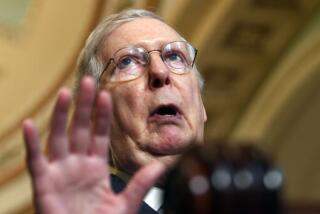Medicare Fund Prognosis Improves a Bit : Health: Hospital trust now expected to be bankrupt in 2002. Date when Social Security retirement and disability funds run out of money also is postponed--to 2030.
- Share via
WASHINGTON — Medicare’s hospital trust fund has gained a year of breathing room but is still heading for bankruptcy early in the next century, the system’s trustees warned Monday, unless taxes are raised or benefits are curtailed.
The date when the Social Security retirement and disability trust funds will run out of money also was postponed until 2030, a year later than the estimate in last year’s trustees’ report.
“Prompt, effective and decisive action” is needed to rescue the Medicare fund, which will run out of money in 2002, compared with 2001 in last year’s projection, the trustees said in their annual report.
Although they sounded an alarm, the trustees--four Clinton Administration officials and two outside experts--declined to offer any specific plan for the politically delicate job of assuring the financial solvency of Medicare, which helps pay the hospital bills for 32 million Americans older than 65 and for 4 million disabled persons.
The slowdown in the medical inflation rate, which helped Medicare as well as private payers last year, offered some temporary fiscal solace without making any dent in the bigger problem.
The debate over the future of Medicare promises to be particularly fierce this year, because Republican congressional leaders are hoping to save more than $150 billion from projected Medicare outlays over the next five years to help pay for tax reductions.
One possible solution would be to force Medicare beneficiaries into managed-care networks. Millions of Americans are moving into managed care, with their selection of doctors limited through health maintenance organizations or other networks arranged by their employers. The Medicare beneficiaries are the last large group of consumers who can go to any doctor who will accept them as a patient without the referral approval needed in many managed-care systems.
The latest report on the hospital trust fund “illustrates again the need for reform of the health care system to reduce the rate of growth in spending,” Donna Shalala, secretary of health and human services and a trustee, said Monday.
Medicare spent $164.8 billion last year, including $104.5 billion through the Part A hospital trust fund. It is financed by a tax of 1.45% on both employers and workers on all salaries. At current rates of spending, the tax revenues will be insufficient to pay benefits in 2002.
Part B of Medicare, which helps pay doctor bills, is 75% financed by general tax revenues, with the rest coming from the beneficiaries’ premiums of $46.10 a month.
*
The longer-range dilemma for policy-makers, politicians and the public is the fate of Social Security’s retirement and disability funds, financed by payroll taxes of 6.2% each by businesses and their workers, on wages up to $61,200 this year.
Social Security collected $381.1 billion in taxes last year and spent $323 billion in benefits for retirees, spouses, survivors and disabled workers and their families. It is a pay-as-you-go system: Payroll taxes are collected from 141 million workers to provide benefits for 43 million people. By the middle of the next century, there will be only two workers per beneficiary.
With revenues exceeding spending, the annual surpluses are invested in government securities and help reduce the overall size of the federal deficit.
Monday’s report “reinforces the message that we must address the long-range issues facing Social Security, but we are not on the eve of a crisis,” Social Security Commissioner Shirley Chater said.
House Speaker Newt Gingrich (R-Ga.) has said Medicare needs to be rethought from the ground up, and other GOP leaders have said they hope to save $150 billion or more over the next five years by slowing the program’s growth.
More to Read
Inside the business of entertainment
The Wide Shot brings you news, analysis and insights on everything from streaming wars to production — and what it all means for the future.
You may occasionally receive promotional content from the Los Angeles Times.










